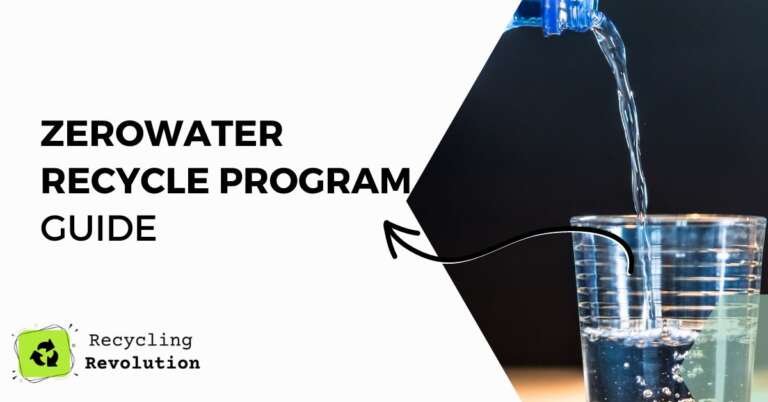Today, it is more crucial than ever to be conscious of our environmental impact. One way we can do our part is by recycling used water bottles. Although not all stores or companies recycle water bottles, ZeroWater Recycle Program does. Hence, this article contains everything you should know about the program. Read on!
What is the ZeroWater Recycle Program
ZeroWater is committed to helping preserve the most precious resource – water. That’s why they partner with TerraCycle, an international leader in recycling, to create the first and only recycling program for water filters.
Now, old ZeroWater filters are recyclable and transformable into new products instead of being landfilled. It’s easy to participate and free. So join us in the mission to protect our planet and recycle your filters today!
How ZeroWater Recycle Program Works
ZeroWater Recycle Program is a way for people to recycle their used ZeroWater filters. The program accepts any used ZeroWater filter, either from a pitcher or dispenser. Collect your used bottles and drop them off at a participating location. The company will then recycle the bottles and use the recycled materials to create new products.
Once the materials are received, ZeroWater recycles and sends customers a $10 coupon for their next purchase. The program is free to join and easy to use. It is a great way to help reduce waste and so on.
How To Get Started With The Recycle Program
It is easy to get started recycling your used ZeroWater bottles. All you need to do is gather your used bottles and bring them to a local recycling center. To start, you should collect the recycling form, complete and return it with the recyclables.
You can put them in a bin or bag. Most centers will have a designated spot for recycling plastic bottles. You can also recycle your ZeroWater bottles at home.
Additional Tips
It’s no secret that recycling is good for the environment. But did you know that recycling your used water bottles can be even easier with a few simple tips? Here are a few tips to help you:
- First, remove the lids from your water bottles before recycling them because most recycling facilities do not recycle plastic lids. Hence you should remove them before putting your water bottles in the bin.
- Rinse out water bottles before recycling them. This will help to remove any lingering dirt or bacteria that could contaminate other materials in the recycling process.
- Be sure to recycle your bottles with other plastics, as they are not recyclable with glass or aluminum.
- Crush the water bottles before putting them in the recycling bin. This will save space and make it easier for the recycling facility to process them.
- Consider recycling your water bottles at a nearby recycling center. For example, take the materials to the ZeroWater location, and they help to ensure your bottles are well-recycled. This will help reduce the amount of waste that goes into landfills and support your local community.
- Once you’ve dropped off your bottles, wash your hands thoroughly.
Follow these simple tips to make recycling your water bottles easier and conserve resources.
The Benefits
The benefits of recycling your used water bottles are many. Below are a few you should know:
1. It helps to conserve our natural resources: The first benefit of recycling your used water bottles is that it helps to conserve our natural resources. Every year, Americans throw away about 2.5 million plastic water bottles. And recycling one water bottle saves enough energy to power a 100-watt light bulb for four hours.
2. It helps to reduce pollution and greenhouse gas emissions: Recycling your used water bottles helps reduce pollution and methane. These are detrimental to human lives, causing sicknesses and other reactions.
3. It helps save energy and money: It takes less energy to recycle a water bottle compared to making a new one. And when you recycle our water bottles, you are also saving the money you would otherwise spend on buying new ones.
4. It helps to create jobs and support the economy: The program also creates jobs by hiring people to work in recycling facilities. It is an employment opportunity for individuals to collect and recycle used Zerowater filters.
Not only does recycling help to reduce environmental waste, but it also helps to support the ZeroWater mission of providing clean, filtered water to everyone. However, recycling your used water bottles improves the economy.
The Future Of ZeroWater Recycle Program
The ZeroWater Recycle Program is a commitment to sustainability. The program enables customers to recycle their used ZeroWater filters and bottle caps, which are used to create new products.
The program is currently in the United States and Canada, and the company hopes to expand its program to reach more people and help more communities. The program has been well-received by customers and has had positive impacts.
Looking to the future, the company plans to continue to invest in the program and expand its reach to more countries. Additionally, the company is working on ways to make the program even more efficient and effective. With continued investment and innovation, the ZeroWater Recycle Program will continue to be a vital part of sustainability efforts.
Conclusion
ZeroWater Recycle Program is a free program that allows you to recycle your used filters and receive a $10 coupon. This program protects the environment, so join the ZeroWater Recycle Program today and do your part to make a difference!
Frequently Asked Questions
When did ZeroWater Recycle Program start?
ZeroWater Recycle Program began on October 9, 2008.
How much does it cost to participate in ZeroWater Recycle Program?
There is no cost to participate in ZeroWater Recycle Program.
How many water bottles can I recycle through the ZeroWater Recycle Program?
You can recycle up to 24 water bottles per month.

